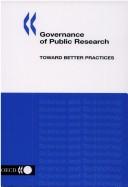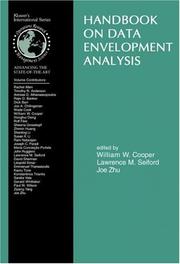| Listing 1 - 9 of 9 |
Sort by
|
Book
ISBN: 9264193324 9264193316 Year: 2013 Publisher: Paris : OECD Publishing,
Abstract | Keywords | Export | Availability | Bookmark
 Loading...
Loading...Choose an application
- Reference Manager
- EndNote
- RefWorks (Direct export to RefWorks)
Public research is the source of many of today’s technologies from the GPS and MRI to MP3 technology. Public research institutions (PRIs) and universities are also an engine of entrepreneurial ventures from biotech start-ups to Internet giants like Google. Today, globalisation, open innovation and new forms of venture financing such as crowd funding are changing the way institutions promote the transfer and commercialisation of public researcher results. This report describes recent trends in government and university level policies to enhance the transfer and exploitation of public research and benchmarks the patenting and licensing activities of PRIs and universities in a number of OECD countries and regions, including the EU, Australia, Canada, and the US. Finally, it also showcases, based on case studies of leading institutions in Finland (Aalto Center for Entrepreneurship), Germany (Fraunhofer Institute), the Czech Republic (Technology Transfer Office of the Czech Technical University), Japan (open innovation in firms), United States (National Institutes of Health) a number of good practices for increasing the number of university invention disclosures, accelerate licensing contracts and promote more open innovation practices between universities and firms.
Research --- Management. --- Finance. --- Government policy. --- Science --- Science research --- Scientific research --- Research management --- Information services --- Learning and scholarship --- Methodology --- Research teams
Book
ISBN: 9264006974 Year: 2005 Publisher: Paris : OCDE,
Abstract | Keywords | Export | Availability | Bookmark
 Loading...
Loading...Choose an application
- Reference Manager
- EndNote
- RefWorks (Direct export to RefWorks)
Compte tenu, d’une part, de l’importance grandissante de la concurrence et de la portée géopolitique de l’enseignement supérieur et de la recherche, et, d’autre part, du retard de développement de nombreux EES nouveaux, cette étude cherche à analyser les processus et les stratégies élaborés par les nouveaux EES pour développer leur activité de recherche. Cet ouvrage propose un panorama unique des expériences d’un groupe d’établissements qui n’a jusqu’à présent pas été défini ni exploré. Il examine les résultats d’une étude de fond portant sur 25 EES situés dans 16 pays : Australie, Belgique, Canada, Danemark, Espagne, Finlande, Grèce, Hong Kong Chine, Hongrie, Irlande, Japon, Nouvelle-Zélande, Portugal, République tchèque, Royaume-Uni, Suède.
Education, Higher -- Research. --- Electronic books. -- local. --- Research -- Finance. --- Research -- Management. --- Research institutes. --- Education --- Social Sciences --- Theory & Practice of Education --- Education, Higher --- Research --- Research. --- Management. --- Finance. --- Institutes, Research --- Research centers --- Think tanks --- Universities and colleges --- Research management --- Institutional research (Education) --- Research in higher education --- Research institutes --- Learned institutions and societies

ISBN: 1280172193 9786610172191 9264103767 9264103740 Year: 2003 Publisher: Paris : OECD Publishing,
Abstract | Keywords | Export | Availability | Bookmark
 Loading...
Loading...Choose an application
- Reference Manager
- EndNote
- RefWorks (Direct export to RefWorks)
This report deals with public sector research. It provides a comprehensive review of the challenges that call for changes in the governance of OECD countries’ science systems. It highlights emerging policy responses developed in these countries indicating better practices to deal with the challenges, and draws policy lessons that can inspire the reform process. Supporting chapters provide detailed descriptions and analyses of the structures of science systems, the procedures for priority setting, the changes to funding, and the management of human resources in R&D.
Research. --- Research --- Science --- Physical Sciences & Mathematics --- Sciences - General --- Management --- Finance --- Personnel management --- Science research --- Scientific research --- Natural science --- Science of science --- Sciences --- Research management --- Information services --- Learning and scholarship --- Methodology --- Research teams --- Science. --- Management. --- Finance. --- Personnel management. --- Natural sciences

ISBN: 9264017437 9789264017450 9789264017436 9786610171798 1280171790 9264017453 Year: 1977
Abstract | Keywords | Export | Availability | Bookmark
 Loading...
Loading...Choose an application
- Reference Manager
- EndNote
- RefWorks (Direct export to RefWorks)
This publication sheds light on the issues now facing today’s universities as they confront the increasing pressure to “produce” research to keep the competitive edge. Drawing on eight case studies, the report focuses on four key themes: The growing significance of the research mission to higher education. Strengthening structures and processes for research management. Funding and resourcing university research. Nurturing research careers. Case studies highlight issues in Australia, Belgium, Brazil, Germany, Ireland, Malaysia, Portugal and Turkey.
Science --- Higher education --- Research --- Education, Higher --- Research institutes. --- Management. --- Research. --- Finance. --- Research management --- Institutes, Research --- Research centers --- Think tanks --- Universities and colleges --- Learned institutions and societies --- Institutional research (Education) --- Research in higher education --- Research institutes

ISBN: 926400694X 9789264006966 9789264006942 9786610356089 1280356081 9264006966 Year: 2005 Publisher: Paris : Organisation for Economic Co-operation and Development,
Abstract | Keywords | Export | Availability | Bookmark
 Loading...
Loading...Choose an application
- Reference Manager
- EndNote
- RefWorks (Direct export to RefWorks)
Given the increasing competitiveness and greater geo-political significance of higher education and research, and the under-developed profile of many new Higher Education Institutions (HEIs), this study seeks to examine the processes and strategies being devised by new HEIs to grow research. By focusing on new HEIs, this book provides a unique profile of the experiences of a group of institutions that has hitherto been unidentified and unexplored. It analyses results drawn from an in-depth study of twenty-five HEIs from across sixteen countries: Australia, Belgium, Canada, Czech Republic, Denmark, Finland, Greece, Hong Kong China, Hungary, Ireland, Japan, New Zealand, Portugal, Spain, Sweden, United Kingdom.
Science --- Higher education --- Education, Higher --- Research --- Research institutes. --- Research. --- Management. --- Finance. --- Institutional research (Education) --- Research in higher education --- Institutes, Research --- Research centers --- Think tanks --- Universities and colleges --- Learned institutions and societies --- Research management --- Research institutes
Book
ISBN: 1787692035 1787692051 1787692043 178769206X 9781787692039 9781787692053 9781787692046 Year: 2019 Publisher: Bingley, UK
Abstract | Keywords | Export | Availability | Bookmark
 Loading...
Loading...Choose an application
- Reference Manager
- EndNote
- RefWorks (Direct export to RefWorks)
Scientific progress - from creating better medicines to building better bridges or designing improved technology networks - can lead to intriguing business opportunities, but business expertise is not always a natural companion to scientific excellence. Scientists require a nuanced understanding of the modern business environment to successfully navigate the commercial world and maximise the economic potential of their ideas. Management for Scientists explores the core theories and practices in management studies today in a context applicable to those working in the scientific industries. Essential business concepts covered include corporate strategy and business planning, organisation structure, management and operations, and labour and human resources, and these are all viewed through the prism of building, maintaining and developing a scientific business in the pharmaceutical, biotechnology, engineering, maths, and computing sectors. Chapters feature a range of real-world examples from modern science-driven businesses, presented by experienced scientists with demonstrated strategic and economic business expertise.
Research --- Research management --- Management. --- Management --- E-books --- Science --- Business planning. --- Business & Economics --- Management & management techniques. --- Vocational guidance. --- Business enterprises --- Business plans --- Corporate planning --- Corporate strategy --- Corporations --- Strategy, Corporate --- Planning --- Strategic planning --- Science as a profession --- Scientists --- Vocational guidance
Book
ISBN: 1281242012 9786611242015 354077954X 3540779531 364209676X 9783540779537 Year: 2008 Publisher: New York: Springer,
Abstract | Keywords | Export | Availability | Bookmark
 Loading...
Loading...Choose an application
- Reference Manager
- EndNote
- RefWorks (Direct export to RefWorks)
Cooperative game theory is a booming research area with many new developments in the last few years. So, our main purpose when preparing the second edition was to incorporate as much of these new developments as possible without changing the structure of the book. First, this offered us the opportunity to enhance and expand the treatment of traditional cooperative games, called here crisp games, and, especially, that of multi-choice games, in the idea to make the three parts of the monograph more balanced. Second, we have used the opportunity of a second edition to update and enlarge the list of references regarding the three models of cooperative games. Finally, we have benefited from this opportunity by removing typos and a few less important results from the first edition of the book, and by slightly polishing the English style and the punctuation, for the sake of consistency along the monograph. The main changes are: (1) Chapter 3 contains an additional section, Section 3. 3, on the average lexicographic value, which is a recent one-point solution concept defined on the class of balanced crisp games. (2) Chapter 4 is new. It offers a brief overview on solution concepts for crisp games from the point of view of egalitarian criteria, and presents in Section 4. 2 a recent set-valued solution concept based on egalitarian considerations, namely the equal split-o? set. (3)Chapter 5 is basically an enlarged version of Chapter 4 of the first edition because Section 5. 4 dealing with the relation between convex games and clan games with crisp coalitions is new.
Fuzzy sets. --- Game theory. --- Games, Theory of --- Theory of games --- Mathematical models --- Mathematics --- Sets, Fuzzy --- Fuzzy mathematics --- Set theory --- Economic theory. --- Mathematics. --- Operations research. --- Microeconomics. --- Economic Theory/Quantitative Economics/Mathematical Methods. --- Game Theory, Economics, Social and Behav. Sciences. --- Operations Research/Decision Theory. --- Operations Research, Management Science. --- Price theory --- Economics --- Operational analysis --- Operational research --- Industrial engineering --- Management science --- Research --- System theory --- Math --- Science --- Economic theory --- Political economy --- Social sciences --- Economic man --- Decision making. --- Management science. --- Quantitative business analysis --- Management --- Problem solving --- Operations research --- Statistical decision --- Deciding --- Decision (Psychology) --- Decision analysis --- Decision processes --- Making decisions --- Management decisions --- Choice (Psychology) --- Decision making --- Game theory

ISBN: 9781402077975 1402077971 9781402077982 9786610148288 1280148284 140207798X Year: 2004 Volume: 71 Publisher: Boston: Kluwer Academic Publishers,
Abstract | Keywords | Export | Availability | Bookmark
 Loading...
Loading...Choose an application
- Reference Manager
- EndNote
- RefWorks (Direct export to RefWorks)
Data Envelopment Analysis (DEA) is a relatively new “data-oriented” approach for evaluating the performances of a set of entities called Decision- Making Units (DMUs) which convert multiple inputs into multiple outputs. DEA has been used in evaluating the performances of many different kinds of entities engaged in many different kinds of activities in many different contexts. It has opened up possibilities for use in cases which have been resistant to other approaches because of the complex and often unknown nature of the relations between the multiple inputs and outputs involved in many of these activities, which are often reported in non-commeasurable units. DEA has also been used to supply new insights into activities and entities that have previously been evaluated by othermethods. This handbook is intended to represent a milestone in the progression of DEA. Written by experts, who are often major contributors to the topics to be covered, it includes a comprehensive review and discussion of basic DEA models, extensions to the basic DEA methods, and a collection of DEA applications in the areas of banking, education, sports, retail, health care, and a review of current DEA software technology. This handbook’s chapters are organized into three categories: (i) basic DEA models, concepts, and their extensions; (ii) DEA applications; and (iii) xii Preface DEA software packages. The first category consists of eleven chapters.
Data envelopment analysis. --- Statistics. --- Data envelopment analysis --- Statistique --- 519.8 --- Operational research --- AA / International- internationaal --- 380.53 --- 338.023 --- 333.108 --- 306.12 --- 305.0 --- kwantitatieve methoden --- mathematische modellen, toegepast op bedrijfsleven --- operations research --- performance measurement --- wiskundige statistiek --- Analyse van de markten en verkooppolitiek. Handelsvooruitzichten. Marketing. --- Arbeidsproductiviteit. --- Bankreclame en -marketing. --- Indexcijfers van de productie ven van het verbruik. Indexcijfers van de productiviteit. --- Toegepaste econometrie en statistiek (algemene naslagwerken). Statistische onderzoekingen en studiën. --- 519.8 Operational research --- DEA (Data envelopment analysis) --- Linear programming --- Multivariate analysis --- Toegepaste econometrie en statistiek (algemene naslagwerken). Statistische onderzoekingen en studiën --- Indexcijfers van de productie ven van het verbruik. Indexcijfers van de productiviteit --- Bankreclame en -marketing --- Arbeidsproductiviteit --- Analyse van de markten en verkooppolitiek. Handelsvooruitzichten. Marketing --- Operations research. --- Decision making. --- Management science. --- Information technology. --- Business—Data processing. --- Econometrics. --- Engineering economics. --- Engineering economy. --- Business. --- Operations Research/Decision Theory. --- Operations Research, Management Science. --- IT in Business. --- Engineering Economics, Organization, Logistics, Marketing. --- Business and Management, general. --- Trade --- Economics --- Management --- Commerce --- Industrial management --- Economy, Engineering --- Engineering economics --- Industrial engineering --- Economics, Mathematical --- Statistics --- IT (Information technology) --- Technology --- Telematics --- Information superhighway --- Knowledge management --- Quantitative business analysis --- Problem solving --- Operations research --- Statistical decision --- Deciding --- Decision (Psychology) --- Decision analysis --- Decision processes --- Making decisions --- Management decisions --- Choice (Psychology) --- Operational analysis --- Management science --- Research --- System theory --- Decision making --- EFFICIENCE --- DATA ENVELOPMENT ANALYSIS --- MESURE

ISBN: 9780387711638 9780387710815 0387710817 0387711635 1441943803 9786610852048 1280852046 Year: 2007 Volume: 104 Publisher: New York : Springer,
Abstract | Keywords | Export | Availability | Bookmark
 Loading...
Loading...Choose an application
- Reference Manager
- EndNote
- RefWorks (Direct export to RefWorks)
A number of methodologies have been employed to provide decision making solutions to a whole assortment of financial problems in today's globalized markets. Hidden Markov Models in Finance by Mamon and Elliott will be the first systematic application of these methods to some special kinds of financial problems; namely, pricing options and variance swaps, valuation of life insurance policies, interest rate theory, credit risk modeling, risk management, analysis of future demand and inventory level, testing foreign exchange rate hypothesis, and early warning systems for currency crises. This book provides researchers and practitioners with analyses that allow them to sort through the random "noise" of financial markets (i.e., turbulence, volatility, emotion, chaotic events, etc.) and analyze the fundamental components of economic markets. Hence, Hidden Markov Models in Finance provides decision makers with a clear, accurate picture of core financial components by filtering out the random noise in financial markets. .
operationeel onderzoek --- speltheorie --- management --- Operational research. Game theory --- kansrekening --- Business management --- Planning (firm) --- handelswetenschappen --- mathematische modellen --- bedrijfskunde --- financiën --- Finance --- stochastische analyse --- Markov processes --- Finances --- Markov, Processus de --- Mathematical models --- Modèles mathématiques --- EPUB-LIV-FT LIVECONO LIVGESTI SPRINGER-B --- Operations research. --- Finance. --- Distribution (Probability theory. --- Business. --- Operations Research/Decision Theory. --- Finance, general. --- Mathematical Modeling and Industrial Mathematics. --- Probability Theory and Stochastic Processes. --- Business and Management, general. --- Operations Research, Management Science. --- Distribution functions --- Frequency distribution --- Characteristic functions --- Probabilities --- Funding --- Funds --- Economics --- Currency question --- Operational analysis --- Operational research --- Industrial engineering --- Management science --- Research --- System theory --- Trade --- Management --- Commerce --- Industrial management --- 305.91 --- AA / International- internationaal --- Analysis, Markov --- Chains, Markov --- Markoff processes --- Markov analysis --- Markov chains --- Markov models --- Models, Markov --- Processes, Markov --- Stochastic processes --- Econometrie van de financiële activa. Portfolio allocation en management. CAPM. Bubbles --- Decision making. --- Mathematical models. --- Probabilities. --- Management science. --- Quantitative business analysis --- Problem solving --- Operations research --- Statistical decision --- Probability --- Statistical inference --- Combinations --- Mathematics --- Chance --- Least squares --- Mathematical statistics --- Risk --- Models, Mathematical --- Simulation methods --- Deciding --- Decision (Psychology) --- Decision analysis --- Decision processes --- Making decisions --- Management decisions --- Choice (Psychology) --- Decision making --- Markov processes.
| Listing 1 - 9 of 9 |
Sort by
|

 Search
Search Feedback
Feedback About UniCat
About UniCat  Help
Help News
News